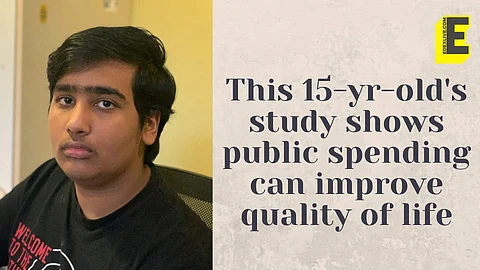

Like so many of us, the pandemic was an eye-opener for 15-year-old Narasimhan Raghava
Raghavan had limited resources and could only conduct research on the five south Indian states — Tamil Nadu, Andhra Pradesh, Telangana, Karnataka and Kerala. He looked at government data from 2014 to 2017. Among his various inferences, Raghavan tells us a few. "Between 2015 and 2017, there's an 11 per cent increase in public spending on healthcare in Tamil Nadu. Comparing this with the infant mortality rate, it declined from 19 to 16 between 2015 and 2017," he says. Citing another example, Raghavan says, "In Andhra Pradesh and Telangana, there has been a 20 per cent increase in public spending on healthcare between 2014 and 2017. During this same period, there has been a three-and-a-half-year increase in life expectancy."
While these findings don't point to a cause-effect relationship, Raghavan has been able to prove a direct positive correlation. "Being a Class XII student, I had limited time and could only look at three factors — mortality rate, infant mortality rate and life expectancy," explains Raghavan. He has been working on this research project for around three months now and only just wrapped it up in September, when he also sent it to a journal for publishing. Speaking about why he didn't consider a post-COVID study, Raghavan adds, "While there is a lot of healthcare data and an increase in public spending due to COVID, the true extent of its effect is not yet known. COVID isn't over yet and therefore, I wanted to consider a period that's not influenced by so many external factors."
But how relevant is the study in the post-COVID world? "COVID is an extenuating circumstance. The data and the inferences determined will probably differ during this anomaly. But this study is still relevant when COVID is eradicated and I'm hoping that an increase in public expenditure on healthcare due to COVID will also improve the quality of life indices in the future," states Raghavan, who has been guided by Carnegie Mellon University researcher Dr Patrick Funk for this project. "I was matched with Dr Patrick after I enrolled for a research mentorship programme. He helped me understand how to do research, what format to follow and also gave suggestions on what I should research about," recalls Raghavan.
Data, however, is not something new to Raghavan. "During Class IX and X, I interned with a finance start-up where I helped them develop a marketing campaign. I self-learnt R (a data model) and then applied that to build a model to see how various sets of data correlate with each other. The start-up uses this data model in their marketing campaigns till date. That's how I began working with data," says Raghavan, who skipped two grades in between and will graduate school at 15.
